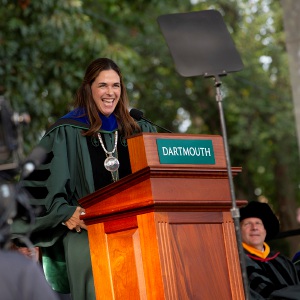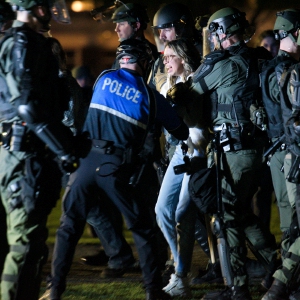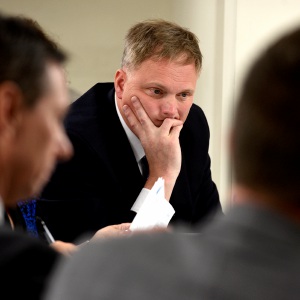First in wave of tax hikes looms for Lebanon

Lebanon firefighters Eric James, left, Lt. Joel Coelho, Lt. Todd Hamilton and Dan Huff stand outside Lebanon City Hall on Thursday, Oct. 24, 2024. The Lebanon Firefighters Union is organizing to encourage city government to budget for more firefighting positions. (Valley News-Jennifer Hauck) Jennifer Hauck
| Published: 11-22-2024 6:01 PM |
LEBANON — City taxpayers are facing an unusually high 11.9% municipal property tax rate increase next year, the first of what is expected to be multiple years of the double-digit increases, while lowering tax increases would require widespread cuts to city services.
Driving the projected tax rate is a more than 10% increase in the city’s general fund. These increases primarily come from changes in wages and benefits for city employees — including an 18% increase in employee health insurance rates announced in late September — one new firefighter position and debt repayment for major projects, City Manager Shaun Mulholland said.
Single-digit rate increases are typical in Lebanon. For example, the tax rate increased by 7.7% in 2024.
But Mulholland expects the city’s portion of the tax rate to increase by more than 10% annually through 2028. This is mostly because of debt repayment for capital projects, including construction of the new downtown fire station, and decreased use of the city’s unassigned fund balance to shield taxpayers from increases. (The projected tax rate does not include the cost of school or state budgets.)
The unassigned fund balance change is necessary as that fund — which is supposed to cover unexpected expenditures — is shrinking, Mulholland said. City policy stipulates that the unassigned fund balance be between 15% and 19% of the general fund expenditure budget; for 2025, it sits at 19.9%; Mulholland projects at similar usage levels it will drop below 15% in 2027.
There will be a public comment period at the City Council’s regular meeting Dec. 4 at 7 p.m. in City Council Chambers and a public hearing Dec. 18 at 6 p.m. before the City Council votes on a final approved budget that night. The approved budget will go into effect Jan. 1.
Mulholland presented his recommended 2025 city budget at an Oct. 29 City Council meeting. This budget totals almost $94 million, a decrease from 2024.
Because of the projected trend of double-digit tax rate increases, the City Council asked Mulholland to present multiple versions of the budget, including scenarios with detailed cuts.
Article continues after...
Yesterday's Most Read Articles
 Hundreds of alumni sign letter urging Beilock, Dartmouth to make a stand for academic freedom
Hundreds of alumni sign letter urging Beilock, Dartmouth to make a stand for academic freedom
 Kenyon: A year later, effects of mass arrests at Dartmouth linger
Kenyon: A year later, effects of mass arrests at Dartmouth linger
 ‘A bit Kafkaesque’: Federal judge spars with government lawyer over status of Dartmouth international student
‘A bit Kafkaesque’: Federal judge spars with government lawyer over status of Dartmouth international student
 Woodstock demotes police chief to patrol officer
Woodstock demotes police chief to patrol officer
 High school baseball: Windsor rebuilds while Thetford shines
High school baseball: Windsor rebuilds while Thetford shines
 Outgoing Alice Peck Day CEO led hospital through growth and change
Outgoing Alice Peck Day CEO led hospital through growth and change
His recommended budget comes with the 11.9% tax increase, he said in a Wednesday interview.
Two additional 2025 spending plans provided to the council had projected tax rate increases of 3.8% and 7%, respectively.
To achieve these lower rates, widespread cuts would be made to the majority of city departments for a total of between $1.27 million for a 7% tax rate increase and $2.13 million for a 3.8% tax rate increase.
“That is merely for information for (the City Council) to see what potentially could occur… so we realize that when there are cuts there’s potential impact to services,” Mulholland said.
Per city policy, the City Council could choose to adopt any of the three proposed budgets or develop its own.
Mayor Tim McNamara said he expects the City Council to make decisions on a department by department basis, rather than to accept any of the budgets in its entirety, he said Thursday.
The multiple budget proposals and the projected tax rate increase have led to an unusual level of public interest in the budget process, Mulholland said. He anticipates a big turnout at the Dec. 4 City Council meeting.
“Normally we don’t hear from anybody… this year I think is going to be very, very different in that we’re going to have a large number of people speaking,” Mulholland said. “I also think we’re going to have people saying, ‘Don’t raise taxes this much.’ ”
Discussions during the public comment period will probably focus on an ongoing “pivotal” conversation about firefighter staffing and a public information campaign mounted by the library to reject the cuts outlined in the decreased budgets, Mulholland said.
Mulholland is not recommending cuts to library services or positions.
However, the 3.8% and 7% budgets would eliminate one or two full-time librarian positions responsible for children’s programming and technology and would slash additional spending on equipment, repairs and professional development. The library currently has seven full time librarian positions each responsible for different services.
Such cuts would affect the library’s ability to serve as a source of “lifelong learning,” Library Director Sean Fleming said at a Nov. 14 City Council meeting.
“We would not be the institution that we are right now (with these cuts,) because libraries are of course the materials that people come in for… but if you don’t have a good staff to help guide people … you’re really not accomplishing what the mission is of a library,” Fleming said.
In several other departments, cuts would also eliminate full-time positions including one or two police patrol officers. Other cuts would decrease service hours at the West Lebanon fire station, plowing and sidewalk maintenance, Recreation, Arts and Parks programming, including closing the city pool, and contributions to social service organizations.
McNamara said he expects each city councilor to use the alternative budget scenario in their own way as they make their decisions, but he has found them “very helpful.”
“It would be great if we could get the budget down somewhat,” he said.
While he said he’s “sensitive to the fact that most people don’t want to see a reduction in services,” he’s also “particularly concerned” about the impact of rising tax rates on what he described as “the most vulnerable groups” such as “the elderly and low- to moderate-income folks.”
“Those are the folks I’m really concerned about and are we literally driving them out of the city?”
Clare Shanahan can be reached at cshanahan@vnews.com or 603-727-3216.






 Lebanon to close street, block parking to allow outdoor dining
Lebanon to close street, block parking to allow outdoor dining More research time or information overload? Lawmakers weigh moving state primary elections 3 months earlier
More research time or information overload? Lawmakers weigh moving state primary elections 3 months earlier
